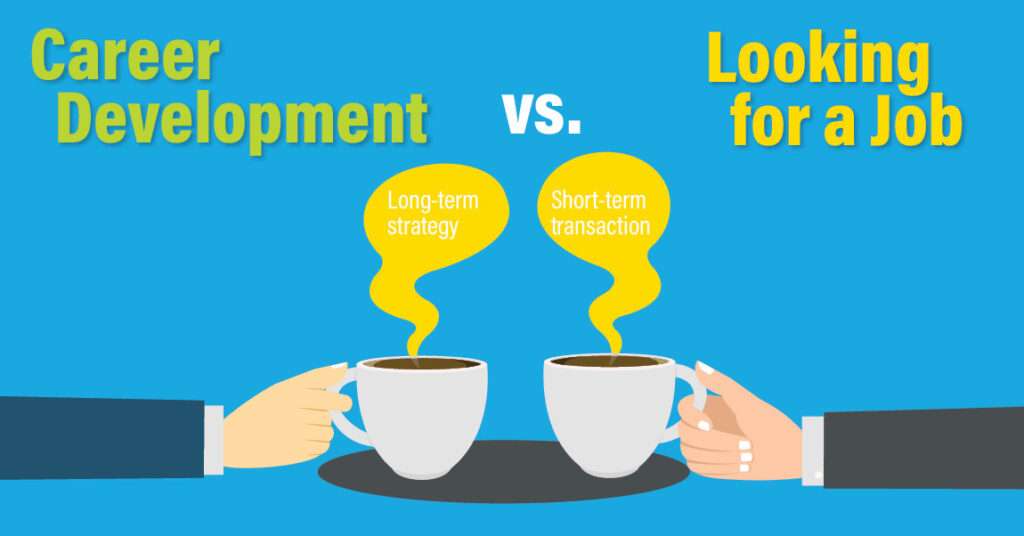Do you know the difference between career development vs. looking for a job? A job search is immediate and transactional—you are searching for a position with the goal of an employer hiring you. Career Development is a continuous, long-term strategy that involves exploration, goal setting, skill building, and most importantly networking to reach your full potential and achieve professional fulfillment. Here’s how to get started:
- Time for Reflection: It’s not easy in the day-to-day grind of a busy work and personal life, but find quiet time for self-reflection and analysis of your current job situation. Understand your strengths, weaknesses, values, and passions. What’s going well, what’s not? What do you enjoy doing? What can you improve? Are you in a growth sector or is it fading? Find a trusted colleague who can provide some objective insights.
- Do some initial research: What is happening in your industry and what are your growth options? What other industries could your skillsets and experience transfer to? Every industry has a peripheral ring of vendor/client organizations that overlap into each other. Additionally make sure to have a conversation with your manager to gather intel and discuss growth opportunities in your current company.
- Who do you Know? It’s important to build a professional network in multiple sectors. This can start with your list of friends, including those you attended school with. Consider what they do for a living, reach out and ask for their time to discuss their career, their likes, dislikes, recommendations, etc., over a cup of coffee. Remember to be attentive, considerate, and appreciative for their time and input. If they do give you time, pick up the cost of their coffee and make sure to thank them with a card or email.
- Attend industry events: Join professional associations, and connect with colleagues in your industry. Make notes of who you have met and what impressed you at the time, as it’s easy to forget new people met as time passes. Don’t mistake quantity for success. Your network doesn’t have to be a large number of people, but it should include people you respect and would feel comfortable reaching out to via email or a phone call.
- Build Relationships: Do not wait until you are desperate to change jobs or industries to reach out to your network. Make that coffee date now, so the meet up can be relaxed and friendly. Use the time to get to know your contact and let them get to know you. Ask questions that help you understand their day-to-day job function. Be upfront about what your skill sets are and ask for their opinion.
- Consider it an Exploration; Not every connection has to pan immediately. Be authentic, open-minded, and curious. Take the time to really listen and learn and expand your knowledge base. Networking works best as an investment for the future, not as an opportunity to trade business cards.
- What to say if considering changing industries: Changing sectors can be daunting as it’s hard to know where to start. An example of how to make the ask is, “I’m not looking for a job at this time, but I’m exploring changing industries. I want to find out more about what you do and tell you a bit about my work history and get your opinion. Can we get a coffee to discuss?”
- Regroup: Once you have a clearer understanding of various industries and roles, take the time to reevaluate. Now would be a good time to set SMART goals (Specific, Measurable, Achievable, Relevant, Time-bound). These goals will serve as your roadmap, providing direction and purpose to your career development.
- Commit to Learning and Skill Development: Staying relevant requires a commitment to continuous learning. Identify the skills needed in your current role and the skills that will propel you forward. Attend workshops, pursue certifications, enroll in courses, and leverage online platforms. Investing in your skill set not only enhances your expertise but also demonstrates to employers your commitment to growth.
- Asking for a Referral: When asking someone in your network for a referral it’s crucial that they feel they know you and your skillsets before putting their reputation on the line. People generally like to help out, so if you’ve taken all of the steps recommended, reaching out to someone in your network shouldn’t be that hard. Be sure to follow up and do what you say you’re going to do, and remember to keep your referral contact updated with how things went so they are not caught off guard or made to look foolish.
Embarking on a journey of career development is a dynamic and ongoing process. By incorporating these tips, you’ll be better equipped to seize opportunities, and build a fulfilling and successful career. Remember, the path to success is unique to each individual, and the key lies in intentional planning, continuous learning, maintaining a strong network, and a commitment to personal and professional growth. Lead on!

